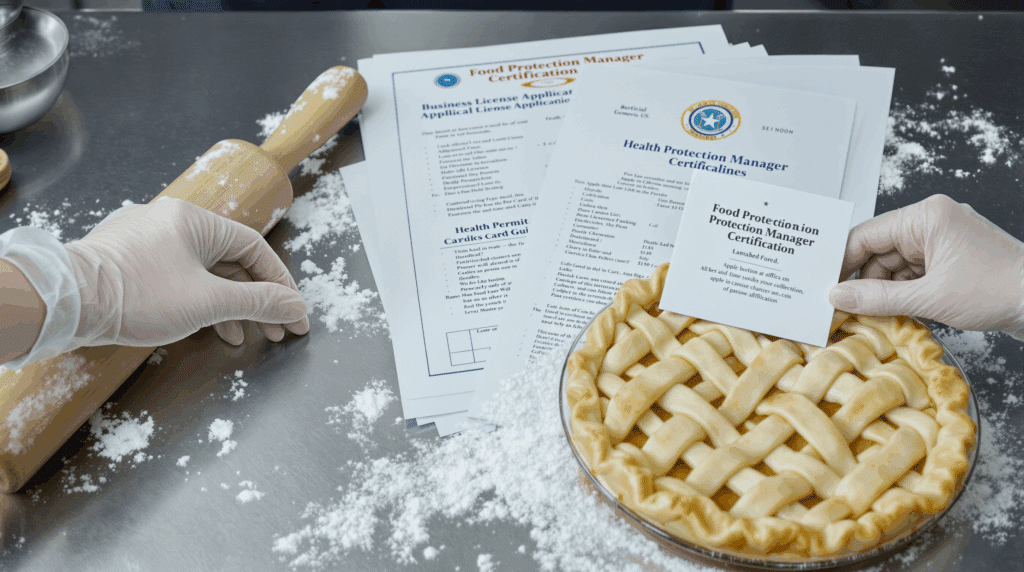You’ve budgeted your startup costs and perhaps secured funding. Your recipes are perfected, and your niche is defined. Now, it’s time to tackle a less glamorous but absolutely critical aspect of launching your bakery in the United States: the complex web of legal requirements, licenses, permits, and health codes. Think of compliance not as mere red tape, but as the essential structure holding your bakery upright – protecting you, your customers, and your hard-earned reputation. Ignoring these “legal loaves” can lead to hefty fines, forced closures, and irreparable damage to your dream, regardless of where you set up shop.
Beyond Baking: Why Compliance is Non-Negotiable
In the excitement of launching a creative venture like a bakery, it’s tempting to view legal and regulatory hurdles as tedious distractions. However, understanding and adhering to these rules from day one is fundamental for several reasons:
- Public Health: Health codes exist to prevent foodborne illnesses. Compliance protects your customers’ well-being, which is paramount. An outbreak linked to your bakery could be devastating financially and ethically.
- Legal Operation: Without the proper licenses and permits, your business isn’t operating legally. This exposes you to significant fines, shutdowns by authorities, and potential legal action.
- Business Credibility: Operating in full compliance builds trust with customers, suppliers, potential investors, and employees. It shows professionalism and commitment.
- Risk Management: Proper licensing, insurance, and adherence to safety standards help mitigate financial risks associated with accidents, lawsuits, or unexpected events.
- Foundation for Growth: Starting correctly makes future expansion, seeking further funding, or even eventually selling the business much smoother.
Compliance isn’t just about following rules; it’s about building a responsible, sustainable, and trustworthy business within your community.
CRITICAL NOTE: The United States has a highly decentralized regulatory system. Legal and health requirements for food businesses vary significantly not only from state to state, but often from county to county and city to city. This article outlines common types of requirements, but you MUST research and comply with the specific regulations applicable to your exact business location. Always consult official government websites (federal, state, county, city) and seek advice from local professionals licensed in your state. Information can change; always verify you have the most current requirements.
Layer 1: Registering Your Business Entity
Before applying for most licenses, your business needs a formal legal identity.
- Choose Your Structure: Decide on a legal structure (Sole Proprietorship, General Partnership, Limited Liability Company (LLC), S-Corporation, C-Corporation). Each impacts liability, taxation, and administration. LLCs and S-Corps are common for liability protection. Consult with an attorney and CPA licensed in your state.
- Register Your Business: LLCs and corporations typically register with the Secretary of State‘s office (or equivalent agency) in the state where you are forming the business.
- Fictitious Name / DBA Registration: If operating under a name different from your legal entity name (e.g., “Main Street Bakery” instead of “Jane Doe LLC”), you’ll likely need to register a “Doing Business As” (DBA) or fictitious name. This might be done at the state or county level, depending on state law.
- Employer Identification Number (EIN): Obtain an EIN from the Internal Revenue Service (IRS). Required for corporations, partnerships, employing others, or certain tax filings. Apply for free directly at IRS.gov.
Layer 2: Essential Licenses and Permits – The Paper Trail (US General)
Expect multiple layers of approvals. The specific names of licenses and the issuing agencies will vary.
- Federal Requirements:
- EIN from the IRS.
- Food and Drug Administration (FDA): Sets national food safety standards (often via the FDA Food Code, which most states adopt parts of), regulates labeling for packaged foods, and oversees interstate commerce of food products. Direct FDA permits are usually for larger manufacturers or specific activities, but their regulations heavily influence state/local health codes.
- State Requirements:
- State Business License/Registration: Many states require registration with the Secretary of State and/or Department of Revenue (or Taxation/Finance).
- Seller’s Permit / Sales Tax ID: Required to collect state sales tax. Issued by the state’s Department of Revenue (or equivalent).
- State Food Service License/Permit: CRITICAL. Many states require a specific license to operate a food establishment. This may come from the State Department of Health, Department of Agriculture, or a specialized business regulation agency. In some states, this authority is delegated to county health departments. Finding out which state agency (or if it’s county-level) oversees food service licensing is a top priority. This process usually involves plan reviews and pre-opening inspections.
- County Requirements:
- County Business License/Tax Receipt: Often required in addition to state licenses. Check with your county clerk or tax collector’s office.
- County Health Department Permit: In many states, the county health department is the primary agency responsible for issuing food permits and conducting health inspections, enforcing state and local codes. Even if the state issues a primary license, county approval might still be needed.
- City/Municipal Requirements:
- Local Business License/Tax Receipt: Most cities require their own license to operate within city limits.
- Zoning Approval: Absolutely essential. Before signing a lease, confirm with your city or county Planning/Zoning Department that a bakery is a permitted use for that specific property address and zone.
- Building Permits: Required for any construction, renovation, or installation of major systems (electrical, plumbing, ventilation). Issued by the city or county building department. Usually requires using licensed contractors.
- Sign Permit: For exterior business signage.
- Fire Department Permit/Inspection: Ensures compliance with local fire codes (exits, extinguishers, alarms, hood suppression systems if applicable).
Finding What You Need:
- Start with official government websites for your specific State, County, and City. Look for business sections, health departments, planning/zoning, and tax agencies.
- Utilize the Small Business Administration (SBA.gov) website – it has resources and links to state/local information.
- Contact your local Small Business Development Center (SBDC) office or SCORE chapter. They offer free counseling and can help point you to the right local resources.
Layer 3: Health Codes and Food Safety – Protecting Your Customers and Your Business (US General)
State and local health departments are typically responsible for enforcing food safety regulations, often adopting or adapting the FDA Food Code. Consistency and vigilance are key.
The Importance of Food Safety
Prevents illness, builds trust, avoids closures. Health inspection results are often public records.
Key Areas Governed by Health Codes (Based on FDA Food Code Principles):
- Facility Layout & Construction:
- Plan Review: Submit detailed plans to the relevant health department (state or county) for approval before construction/renovation.
- Surfaces: Floors, walls, ceilings in food areas must be smooth, durable, non-absorbent, easily cleanable.
- Sinks: Specific requirements for dedicated handwashing sinks (properly supplied), warewashing sinks (often 3 compartments), and potentially food prep sinks.
- Water & Plumbing: Approved potable water source, adequate hot water, required plumbing (e.g., backflow prevention), grease traps often required by local codes.
- Refrigeration/Freezing: Sufficient commercial units maintaining safe temperatures (generally below 41°F / 5°C for refrigeration, 0°F / -18°C or below for freezers). Require internal thermometers.
- Ventilation: Proper systems, potentially including commercial exhaust hoods per code.
- Pest Control: Preventative measures required.
- Restrooms: Clean, accessible, properly supplied for employees (and customers if applicable based on local codes/seating).
- Lighting: Adequate, possibly shielded fixtures.
- Equipment Standards:
- Use commercial-grade equipment (often NSF-certified), kept clean and in good repair.
- Food Handling & Storage:
- Temperature Control: Adherence to the Danger Zone (generally 41°F to 135°F / 5°C to 57°C). Keep cold foods cold, hot foods hot. Proper procedures for thawing, cooking, cooling (rapidly!), reheating. Use calibrated thermometers.
- Cross-Contamination Prevention: Procedures to separate raw animal products (like eggs) from ready-to-eat foods. Allergen control procedures are increasingly important.
- Storage Practices: Food stored off floor, in food-grade containers, labeled (content/date), FIFO rotation.
- Ingredient Sourcing: Use approved, reputable suppliers.
- Water Supply & Waste Disposal:
- Potable water. Proper, covered trash disposal.
- Employee Hygiene & Training:
- Handwashing: Strict protocols.
- Personal Hygiene: Clean clothes, hair restraints, no eating/drinking/smoking in prep areas, glove use policies.
- Employee Health: Policies requiring sick employees to report illness and be excluded from food handling duties.
- Training & Certification: Certified Food Protection Manager (CFPM): Many jurisdictions require at least one certified manager on staff (e.g., ServSafe or other accredited programs). Food Handler Cards: Many areas also require other food employees to complete basic food safety training. Check your specific state and local requirements.
Health Inspections
Expect unannounced inspections by your state or local health department inspector. They check sanitation, temperatures, food handling, facility condition, and required paperwork. Violations can lead to re-inspections, fines, or closure. Maintain high standards daily.
Layer 4: Other Legal Considerations (US Context)
- Insurance: Essential. Consult a broker licensed in your state.
- General Liability, Property Insurance, Product Liability, Workers’ Compensation (requirements vary significantly by state based on number of employees!), Business Interruption.
- Contracts: Have an attorney licensed in your state review:
- Commercial Lease, Supplier Agreements, Partnership/Operating Agreements.
- Employment Law: Complex interplay of federal and state laws.
- Federal: Fair Labor Standards Act (FLSA – wages, overtime), Equal Employment Opportunity Commission (EEOC – anti-discrimination), Occupational Safety and Health Administration (OSHA – workplace safety), I-9 forms (work eligibility).
- State: Minimum wage (often higher than federal), paid sick leave laws (in some states/cities), termination rules (“at-will” state variations), workers’ comp specifics, state safety plans.
- Intellectual Property:
- Trademarks: Protect brand name/logo federally (USPTO) or at the state level.
- Recipes: Generally protected as trade secrets (requires effort to keep confidential).
- Sales Tax: Register with your state (and potentially local) tax authority, correctly calculate, collect, and remit sales tax on taxable items per state/local law. Taxability rules for food vary.
- Food Labeling (If Selling Pre-Packaged Goods): Comply with FDA requirements: Nutrition Facts, ingredient list, allergen declaration (Food Allergen Labeling and Consumer Protection Act – FALCPA), net weight, business name/address. State laws might add other minor requirements.
Navigating the Maze: Where to Get Help
This seems daunting, but resources exist:
- Official Government Websites: Your primary source for State, County, and City regulations. Use .gov websites.
- Federal Agencies: IRS.gov, FDA.gov, SBA.gov.
- Business Support Organizations: Your local SBDC office and SCORE chapter offer free guidance.
- Professionals (Licensed in Your State):
- Business Attorney
- Certified Public Accountant (CPA)
- Insurance Broker
- Industry Associations: National and state restaurant/baking associations often have compliance resources.
Compliance: An Ongoing Ingredient for Success
Obtaining initial licenses and passing inspections is just the start. Compliance is an ongoing commitment. Licenses need renewal, regulations evolve, and maintaining food safety requires daily diligence. Integrate compliance into your operations. View it not as a burden, but as a fundamental ingredient ensuring the health, longevity, and sweet success of your bakery, wherever you are in the US.







